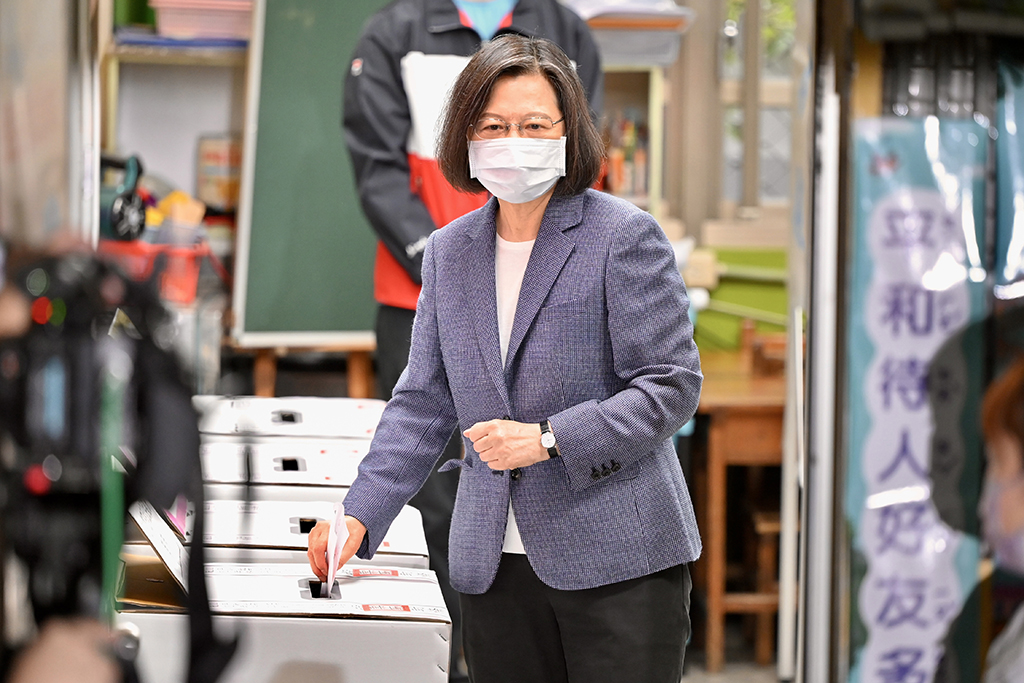TAIPEI, Taiwan: A Taiwanese couple is facing multiple charges for allegedly bribing voters with Chinese COVID tests ahead of the island's local elections, prosecutors said Tuesday. Chiu Jui-lien and her husband are reportedly the first indicted for violating the "anti-infiltration law" aimed at countering influence from China-which views self-ruled Taiwan as part of its territory and has vowed to seize the island.
The law, pushed by President Tsai Ing-wen's ruling party in 2019, bans "hostile" foreign forces from campaigning, lobbying, making political donations or spreading disinformation related to elections. Chiu, who was running for borough chief in Taipei city, and her husband were indicted on Monday for giving out Chinese COVID tests to solicit votes, the Shihlin district prosecutor's office said in a statement.
The free tests were supplied by the Pingtan Comprehensive Experimental Zone in China's Fujian province, established in 2009 with the goal of boosting regional development and its bond with Taiwan. The couple imported 6,000 tests via 60 "dummy accounts" to bypass the required government approval for a shipment of more than 100 kits, according to prosecutors. They later offered the tests to residents in exchange for their votes in the November 26 elections, which Chiu ultimately lost.
The couple were "funded by a source of infiltration" to commit bribery and also violated regulations for importing and supplying medical devices, prosecutors said. The indictment aims to "ensure that the elections... will not be infiltrated and interfered by foreign hostile forces to maintain a fair election environment," the statement said.
China has become more bellicose towards Taiwan under President Xi Jinping, with Beijing ramping up military, diplomatic and economic pressure on Taipei since the 2016 election of Tsai. The president stepped down Saturday as head of her ruling party after it was defeated in the local elections, securing just five cities and counties compared with the Beijing-friendly main opposition Kuomintang party's 13. She will stay on as president until her second and final four-year term ends in May 2024.
Meanwhile, China said Tuesday it would speed up a push to vaccinate people aged 60 and older against COVID-19 after the country posted record daily case numbers in recent days. The announcement comes after a weekend of protests demanding an end to the country's strict zero-COVID policy, which responds to even small caseloads with harsh lockdowns and quarantine orders.
Beijing's National Health Commission (NHC) pledged to "accelerate the increase in the vaccination rate for people over the age of 80, and continue to increase the vaccination rate for people aged 60-79". It also said it would "establish a special working group... to make special arrangements for the vaccination of the elderly against COVID". "It is necessary to conduct popular science education on the meaning and benefits of vaccination, and fully publicize vaccines' efficacy on preventing severe illness and death," it added.
China's low vaccination rates, particularly among the older population, have long been seen as prolonging Beijing's no-tolerance approach to COVID. Just 65.8 percent of people over 80 are fully vaccinated, NHC officials told a press conference Tuesday. And China has not yet approved mRNA vaccines, proven to be more effective, for public use. Many fear that lifting that policy while swathes of the population remain not fully immunised could overwhelm China's healthcare system and cause over a million deaths.
But the zero-COVID policy has stoked massive unrest, with people taking to the streets in China's major cities on Sunday to protest draconian lockdowns and broader restrictions on freedom of movement. A deadly fire last week in Urumqi, the capital of northwest China's Xinjiang region, was the catalyst for the wave of outrage, with protesters blaming COVID restrictions for hampering rescue efforts-claims the government has denied.
China logged 38,421 domestic infections Tuesday, slightly down from record highs seen over the weekend and comparably low when compared to caseloads seen in western countries during the height of the pandemic. - AFP











